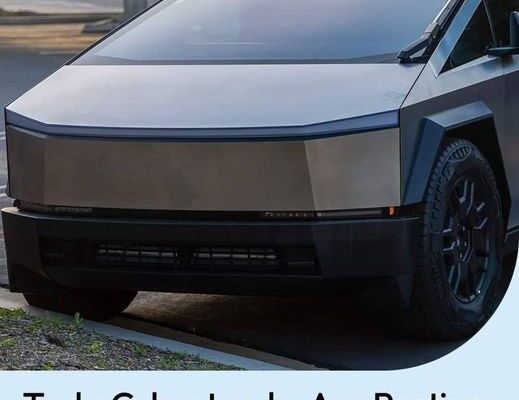
Are Tesla’s ‘Stainless’ Steel Cybertrucks Rusting? Here’s What’s Going On
Tesla’s Cybertruck, known for its bold design and ultra-hard stainless steel exterior, has been one of the most anticipated vehicles in recent memory. But now that the trucks are hitting the streets, early owners are raising concerns about something unexpected: rust. Despite the use of stainless steel, which implies superior corrosion resistance, some Cybertruck owners have reported rust issues just days after delivery. So, what’s causing this, and is it really a problem? Let’s dive in.
Early Rust Reports: A Case of ‘Rust Dust’?

Some early Cybertruck owners have reported orange stains or rust marks after only brief exposure to rain. In one instance, a California-based owner noticed small rust flecks after driving in the rain for just two days. Another owner found similar corrosion after leaving their truck outside in Los Angeles for 11 days. These reports have sparked discussions on forums, with some owners blaming “rust dust“—tiny iron particles from external sources like rail dust or road debris that settle on the vehicle’s surface and cause rust-like discoloration.
Tesla enthusiasts, however, argue that these surface rust issues are minor and can be easily cleaned off with products like Barkeeper’s Friend and glass cleaners. This phenomenon, commonly seen in urban environments, isn’t unique to the Cybertruck. But does this dismiss the bigger concern?
Read More: Tesla driver pulled over going 93 MPH while completely asleep
Can Stainless Steel Actually Rust?

The answer, surprisingly, is yes. While stainless steel is highly resistant to rust, it is not completely immune. Exposure to chloride ions—commonly found in salt and certain cleaning products—can break down the protective chromium oxide layer and lead to pitting corrosion. This is particularly a concern for vehicles exposed to road salt in winter or salty air in coastal areas. Over time, these chloride ions can eat through the chromium layer, exposing the steel underneath and leading to rust spots.
According to Hense, though, it would take prolonged exposure to extremely harsh conditions for significant rust to form on Tesla’s stainless steel. Still, minor surface rust could occur under the right conditions.
Tesla’s Lack of Clear Coat: A Vulnerability?

One factor that might be contributing to the Cybertruck’s rust issues is Tesla’s decision to forgo a clear coat. Most modern vehicles come with a clear coat—a protective layer of transparent paint that helps shield the metal from the elements. Tesla has instead offered a $5,000 urethane-based film as an optional protective measure.
Without this protective layer, the bare stainless steel is exposed to environmental factors like rain, road salt, and pollution, making it more susceptible to discoloration and rust. The fact that some owners are noticing rust within days of owning the truck suggests that this might be a critical oversight.
Is Tesla’s Stainless Steel Choice to Blame?

Unlike traditional car manufacturers, Tesla chose to use stainless steel for the Cybertruck’s body panels—similar to the iconic DeLorean of the 1980s. While stainless steel offers impressive durability and corrosion resistance, it is also heavy, difficult to work with, and expensive. Historically, automakers have steered clear of stainless steel for these reasons, and it’s possible that Tesla’s decision to use the material without additional protective measures is causing these rust issues.
The grade of stainless steel Tesla uses is certainly more resistant to rust than regular steel, but as Hense and others have pointed out, it’s not invincible. The wrong additives or an improper cleaning routine can easily cause issues.
Tesla’s Recommendations to Prevent Rust

Tesla’s own recommendations for maintaining the Cybertruck acknowledge the susceptibility of the stainless steel panels to corrosion. The Cybertruck manual advises owners to immediately clean off corrosive substances like bird droppings, tree resin, and road salt. The manual even warns against washing the vehicle in direct sunlight or using hot water, both of which could damage the finish. Tesla also suggests using alcohol-based solvents to remove tough stains, followed by a rinse with mild soap and water.
These care instructions, while standard for stainless steel appliances, are not what most car owners expect when purchasing a $60,000+ vehicle touted for its durability.
So, Are Tesla Cybertrucks Really Rusting?

In conclusion, while the Cybertruck’s stainless steel body is highly resistant to rust, it’s not immune to surface discoloration, especially in harsh environments. Some of the reported rust may be due to external contaminants like rust dust, but there are legitimate concerns about the long-term durability of the uncoated stainless steel panels.
Tesla owners in coastal areas or places with heavy road salt may want to invest in additional protective measures, like Tesla’s $5,000 wrap, to prevent early signs of rust. Whether Tesla will address these concerns with future updates remains to be seen, but for now, Cybertruck owners may need to exercise extra caution in maintaining their “stainless” vehicles.
In the words of one forum user, the best advice might just be: “Don’t drive it in the rain, or get it wet”.
Read More: Musk Says Tesla Will Begin Production of Humanoid Robots Next Year








 Check comments
Check comments